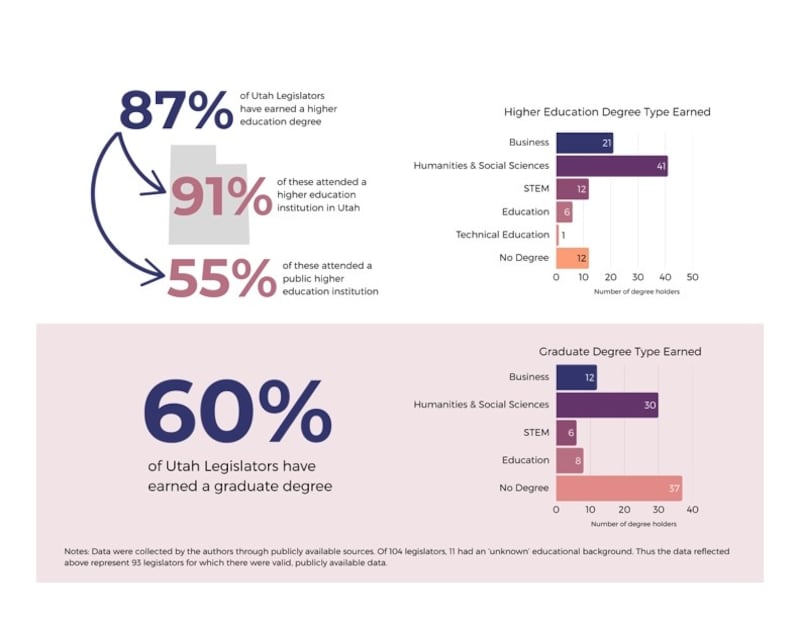Across generations, Utah’s legislature has ensured that all Utahns have access to a world-class education. Our state has thrived because of its investments in higher education. Economic growth, productivity and innovation are all dependent on our ability to train and retain highly educated workers. Utahns with a college degree earn more, are more upwardly mobile, have better health and are more civically engaged.
Yet the future of Utah’s long tradition of investing in higher education is uncertain. Discussions center on efficiency and high-demand, high-paying careers. Proposed reallocations and reinvestments have the potential to leave some kids behind and erode Utah’s commitment to public education and the economic growth that follows.
In anticipation of the upcoming legislative debate on the future of higher education funding, we were curious about the educational backgrounds of our state legislators. Among those who will determine the future of higher education funding, 87% have a higher education degree. Among those, 91% have degrees from Utah colleges and universities. A majority of those earned their degrees from public institutions.

Previous generations of policymakers recognized that every young person in Utah — the rancher’s daughter and the doctor’s son — deserved access to quality education and the opportunity for upward mobility that comes with it. Our current legislators are clear beneficiaries of that legacy.
Beyond technical skills: The value of a well-rounded education
We encourage our elected officials to consider the future of their own children and grandchildren. Do all of them want to be nurses, engineers or computer programmers? Or do some of them dream of being poets, museum curators, financial planners or history teachers? Just as science and technology shape our daily lives, so do the arts, humanities and social sciences. Family vacations often include visits to museums, concerts, historic sites or movies — experiences made possible by professionals from a wide range of academic backgrounds, many who did not know what their major would be when they started college.
Our students are inspired to learn about world languages and cultures, the history of indigenous cultures, the origins of complex political systems and the challenges facing rural communities. We celebrate this curiosity.
Today’s employers seek workers with the skills humanities and social sciences deliver. They want to hire college graduates who are creative problem solvers, who can collaborate with others, who can communicate clearly, who are flexible in addressing challenges as they arise and who have the emotional intelligence to meet workplace complexities head-on.
Research finds that “soft” skills rather than technical know-how predict future income and wellbeing. These are the tools we provide our students in college classrooms across the state, which build lifelong resilience and flexibility, preparing students for whatever lies ahead. With the transformational impact of AI, the demand for many technical skills may disappear. What will endure, however, is the value of critical thinkers, creative problem solvers, and collaborative team members able to navigate us through tomorrow’s challenges.
Over half of current Utah legislators with college degrees majored in humanities and social sciences. A majority of those have graduate degrees, most in humanities and social sciences as well. This makes sense because the same skills that make our students attractive to employers also prepare them for leadership at the highest level.
Governor Spencer Cox understands this well. Speaking about the impact of his bachelor’s degree in political science from Utah State, Gov. Cox said, “[It was] the best education possible … I am where I am today because of the opportunities and the people I met at Utah State who really helped me figure out, you know, who I was and what I wanted to be when I grew up.”
Yet Utah already loses more college graduates than it produces. Nationally, cross-state migration is growing rapidly, especially among college graduates. Cuts to higher education, restrictions on academic programming and limiting students’ access to campus resources pose risks to our continued economic dynamism. Failure to continue Utah’s tradition of investing in excellence risks widening the gap between the rich and everyone else, stunting the economic growth from which we have all benefited.
The future of Utah depends on public higher education
Public higher education in Utah provides opportunities for Utahns to thrive, explore their potential and imagine new possibilities for their lives. Public education also produces the leaders who will guide us through the challenges ahead. We need the talents and imagination of all Utahns to move us toward a prosperous future.
As educators, what drew us to Utah was the shared commitment to education as the foundation of a strong economy and society. What keeps us here are our students, who dream big and achieve more than they thought possible. Our former students lead in every field, and the next generation deserves the same opportunity to thrive.
